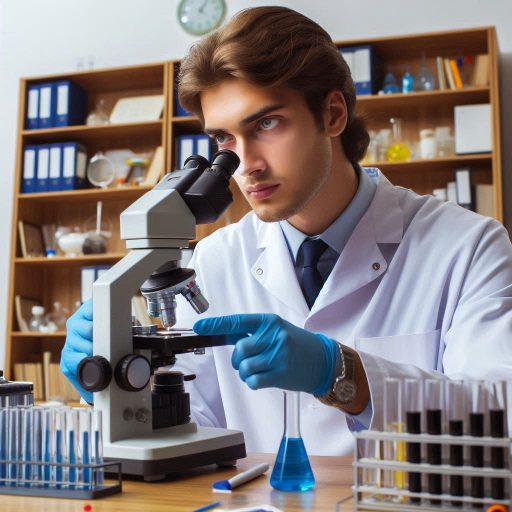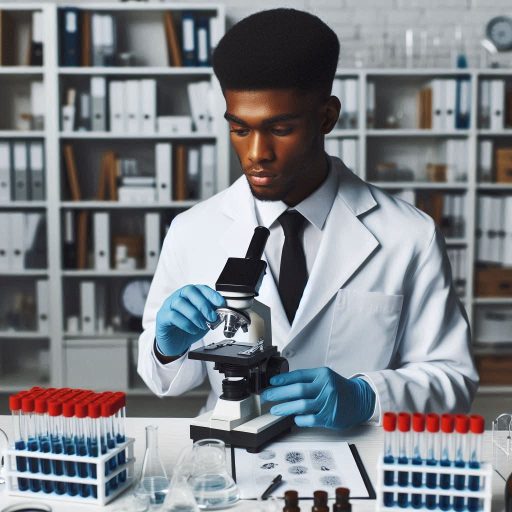Introduction
Forensic toxicology plays a crucial role in criminal investigations.
It involves analyzing biological samples to detect the presence of drugs, alcohol, and other substances.
Toxicologists use various techniques to identify and quantify these substances, which can provide vital evidence in legal cases.
The importance of forensic toxicology cannot be overstated.
In many criminal cases, the presence of drugs or alcohol can significantly impact the outcome.
For instance, toxicology reports can help determine whether a suspect was impaired during a crime.
They can also identify substances that may have contributed to a victim’s death.
Forensic toxicologists analyze samples from various sources, including blood, urine, hair, and tissues.
Each sample type offers different insights into a person’s substance use.
Blood samples provide immediate information about current intoxication levels, while urine tests can indicate past usage.
Toxicology tests can detect a wide range of substances.
Commonly analyzed substances include alcohol, opioids, stimulants, and benzodiazepines.
The detection of these substances can reveal crucial details about an individual’s behavior and mental state at the time of an incident.
Moreover, forensic toxicology also investigates potential poisoning cases.
Toxicologists work to identify harmful substances that may have been ingested or injected.
Their expertise helps law enforcement agencies understand how substances influence criminal behavior.
What is Forensic Toxicology?
Forensic toxicology is a specialized branch of forensic science.
It focuses on detecting and analyzing substances in biological samples.
These samples often include blood, urine, saliva, and tissues.
Forensic toxicologists play a crucial role in criminal investigations and legal cases.
They help determine the cause of death or impairment in various situations.
Their work supports law enforcement, medical examiners, and legal professionals.
Significance in the Field of Forensic Science
The significance of forensic toxicology lies in its ability to uncover vital evidence.
It helps establish links between a suspect and a crime scene.
Forensic toxicologists provide objective data that can influence court decisions.
They often testify as expert witnesses during trials, explaining their findings.
This expertise adds credibility to the evidence presented.
Types of Substances Analyzed
Forensic toxicologists analyze a variety of substances, which can be broadly categorized.
One category includes drugs, both illicit and prescription.
These drugs may include substances like cocaine, heroin, and methamphetamine.
Forensic toxicologists also analyze prescription medications such as opioids and antidepressants.
Understanding these drugs is essential for determining their effects on behavior and health.
Another significant category is alcohol.
Forensic toxicologists measure blood alcohol concentration (BAC) to assess impairment.
This analysis is critical in cases involving DUI (driving under the influence) charges.
It helps establish whether a driver was legally intoxicated at the time of an incident.
Alcohol can significantly affect a person’s ability to function, making this analysis vital.
Additionally, forensic toxicologists examine poisons and toxic substances.
These can include heavy metals like lead and mercury, as well as industrial chemicals.
Analyzing poisons is crucial in suspected homicide or poisoning cases.
Forensic toxicologists identify specific substances and their potential effects on the human body.
This information can determine whether a substance contributed to an individual’s death.
Moreover, forensic toxicologists stay updated on emerging substances.
Novel psychoactive substances (NPS) frequently appear in the drug market.
These substances can pose challenges in detection and analysis.
Forensic toxicologists work diligently to develop methods for identifying these new drugs.
This ongoing research is essential for adapting to changing trends in substance use.
In review forensic toxicology is a vital discipline within forensic science.
Its focus on analyzing drugs, alcohol, and poisons aids investigations significantly.
By providing crucial data, forensic toxicologists help establish facts in legal cases.
Their expertise plays an essential role in the justice system.
Understanding this field is crucial for appreciating its impact on law enforcement and public safety.
Read: Profiles in Success: Leading Chemists of the 21st Century in the US
Importance of Forensic Toxicology in Criminal Investigations
Determining the Cause of Death in Cases Involving Drug Overdoses or Poisoning
Forensic toxicology plays a crucial role in criminal investigations.
It helps determine the cause of death in cases involving drug overdoses or poisoning.
Toxicologists analyze blood, urine, and other bodily fluids to identify harmful substances present in a deceased individual’s system.
This analysis can confirm suspicions of foul play or accidental overdose.
In cases of suspected drug overdose, forensic toxicology can distinguish between intentional and accidental causes.
It can clarify whether a person knowingly ingested lethal substances.
For example, identifying specific drugs can indicate whether a victim was targeted or if it was a tragic accident.
This information can significantly influence the investigation’s direction.
Forensic toxicologists also assess various chemicals in poisoning cases.
They analyze samples for poisons like cyanide, arsenic, or heavy metals.
By identifying these substances, they can help law enforcement determine the method and motive behind the crime.
This knowledge can lead to prosecution and potentially prevent similar incidents in the future.
Role of Forensic Toxicology in Cases of Driving Under the Influence (DUI) and Other Intoxication-Related Crimes
Forensic toxicology is vital in cases of driving under the influence (DUI).
Many DUI cases involve the presence of alcohol or drugs in a driver‘s system.
Toxicologists analyze samples to determine blood alcohol concentration (BAC) levels and the presence of drugs.
This data provides crucial evidence in court proceedings.
When a driver is involved in a crash, toxicology reports reveal if substances impaired their ability to operate a vehicle safely.
If a driver‘s BAC exceeds legal limits, this strengthens the case against them.
Furthermore, the presence of drugs like marijuana or prescription medications can complicate the case.
Forensic toxicology helps clarify these complexities.
In addition to DUI cases, forensic toxicology is essential in other crimes involving intoxication.
Assaults, homicides, and domestic violence cases often involve intoxicated individuals.
Toxicological analysis can reveal whether substances influenced a suspect’s behavior during the crime.
This information can be vital for understanding motives and assessing liability.
Moreover, forensic toxicology aids in identifying patterns of substance abuse in communities.
By analyzing trends in drug-related incidents, law enforcement can develop strategies for prevention and intervention.
This proactive approach can reduce crime rates and improve public safety.
In essence, forensic toxicology is invaluable in criminal investigations.
It determines the cause of death in overdose or poisoning cases.
It also plays a significant role in DUI cases and other intoxication-related crimes.
By providing critical evidence, forensic toxicologists enhance the effectiveness of law enforcement and the judicial system.
Their work ultimately contributes to justice and public safety.
Read: The Life and Times of a U.S. Physicist: A Day in Detail
Process of Forensic Toxicology Analysis
Forensic toxicology plays a critical role in investigations involving drugs, alcohol, and poisons.
The analysis process begins with collecting samples.
Forensic toxicologists primarily work with blood, urine, and tissues.
Each sample type provides different insights into a person’s exposure to substances.
Proper collection techniques ensure the integrity and accuracy of the samples.
Steps Involved in Collecting and Analyzing Samples for Forensic Toxicology Testing
The first step in sample collection is obtaining consent.
Forensic toxicologists usually work alongside law enforcement to secure necessary permissions.
They use sterile containers to prevent contamination.
Following strict chain-of-custody protocols is essential to maintain sample integrity.
This process helps prevent tampering and ensures that the samples can be used as legal evidence.
Once samples are collected, they undergo a preliminary screening.
Toxicologists often use immunoassays for this step.
These tests quickly identify the presence of specific substances, such as drugs or alcohol.
However, immunoassays may produce false positives, necessitating confirmatory testing.
Confirmatory testing involves more sophisticated techniques.
Gas chromatography-mass spectrometry (GC-MS) is one of the most reliable methods.
GC-MS separates and identifies substances in complex mixtures.
It provides definitive results regarding the type and concentration of substances present.
Another technique is liquid chromatography-tandem mass spectrometry (LC-MS/MS), which is highly sensitive and effective for detecting low concentrations of drugs.
Various Techniques and Tools Used by Forensic Toxicologists to Detect and Identify Substances in the Body
In addition to these methods, forensic toxicologists may use solid-phase microextraction (SPME).
SPME allows for the extraction of volatile compounds from samples.
This technique is particularly useful for analyzing breath samples in cases of suspected alcohol impairment.
Quality control is a critical aspect of forensic toxicology analysis.
Laboratories must adhere to strict protocols and guidelines to ensure accurate results.
Regular calibration of equipment and validation of methods are essential.
Toxicologists often participate in proficiency testing programs to maintain their skills and knowledge.
After analysis, toxicologists prepare a detailed report.
This report summarizes the findings and provides interpretations.
Toxicologists may present this information in court as expert witnesses.
Their expertise helps juries understand the implications of the toxicology results.
Forensic toxicology combines science with legal principles.
It requires meticulous attention to detail at every step.
From sample collection to analysis, each phase is crucial for obtaining accurate results.
Understanding this process enhances our appreciation of how toxicology aids in criminal justice.
The work of forensic toxicologists ultimately contributes to solving cases and delivering justice.
Their commitment to accuracy and integrity ensures that the truth comes to light in toxicology investigations.
icologists can provide valuable insights in legal investigations and court proceedings.
Read: Salary Ranges: What to Expect as a Physicist in the USA

Challenges in Forensic Toxicology
Forensic toxicology is a critical field that faces several challenges.
These challenges can impact the reliability of toxicological analyses and their role in legal cases.
Understanding these challenges is essential for professionals in this discipline.
Some of the common challenges faced by forensic toxicologists, such as sample contamination or degradation
Sample Contamination
One significant challenge in forensic toxicology is sample contamination.
Contaminated samples can produce false results, leading to incorrect conclusions.
Even minor contamination can compromise the integrity of the analysis.
To minimize this risk, toxicologists must adhere to strict protocols during sample collection and handling.
Sample Degradation
Sample degradation poses another challenge.
Biological samples, like blood or urine, can degrade over time.
Factors such as temperature and exposure to light can accelerate this process.
Degradation can alter the concentration of substances in the sample, affecting the results.
Therefore, timely processing and proper storage conditions are crucial in maintaining sample integrity.
Importance of Maintaining Chain of Custody
Maintaining a clear chain of custody is vital in forensic toxicology.
A chain of custody documents who handled the samples and when.
This documentation ensures that samples are not tampered with or altered.
Any breaks in this chain can lead to questions about the validity of the findings.
Forensic toxicologists must meticulously document every step of the process to protect the evidence.
Following Proper Procedures
Following proper procedures is essential to achieving accurate results.
Toxicologists must employ validated analytical methods to detect substances.
They must also ensure that all equipment is calibrated and functioning correctly.
Deviations from established protocols can introduce errors, which may jeopardize legal proceedings.
Complexity of Biological Matrices
Another challenge is the complexity of biological matrices.
Different body fluids and tissues can have varying concentrations of toxins.
Toxicologists must interpret these variations to determine exposure levels accurately.
Understanding the pharmacokinetics and metabolism of substances is crucial for accurate analysis.
Interpreting Results
Interpreting results also presents challenges.
Toxicologists must distinguish between therapeutic and toxic levels of substances.
They must consider individual variations, such as age, weight, and health status.
These factors can influence how substances are absorbed and metabolized in the body.
Thus, a comprehensive understanding of toxicology and pharmacology is necessary.
Time Constraints
Moreover, forensic toxicologists often face time constraints.
Rapid turnaround times are essential in legal cases.
However, rushing can lead to oversights and errors.
Toxicologists must balance the need for speed with the necessity of thorough analysis.
Forensic toxicology encounters numerous challenges that can affect outcomes.
From sample contamination and degradation to the importance of maintaining chain of custody, these factors require careful attention.
Adhering to established protocols and understanding the complexities of biological matrices is vital.
By addressing these challenges, forensic toxicologists can provide reliable results that support the legal system.
Transform Your Career Today
Unlock a personalized career strategy that drives real results. Get tailored advice and a roadmap designed just for you.
Start NowRead: Physics Specializations: Choosing Your Path in the U.S.
Career Opportunities in Forensic Toxicology
Forensic toxicology offers a range of exciting career opportunities.
Professionals in this field analyze biological samples to identify drugs, toxins, and poisons.
They play a vital role in criminal investigations and public health.
If you’re interested in a career in forensic toxicology, various paths await you.
Different career paths available in forensic toxicology, such as working in crime labs, medical examiners’ offices, or private laboratories
Working in Crime Laboratories
One common career path is working in crime laboratories.
Crime lab toxicologists analyze evidence from crime scenes.
They identify substances that could contribute to criminal behavior.
Their work often influences the outcomes of criminal cases.
A strong understanding of analytical chemistry is crucial in this role.
Medical Examiners’ Offices
Another option is to work in medical examiners’ offices.
Toxicologists in these settings investigate drug overdoses and poisonings.
They perform autopsies and analyze body fluids.
Their findings help determine the cause of death and inform legal proceedings.
A background in pathology or forensic science enhances your qualifications for this role.
Private Laboratories
Private laboratories also employ forensic toxicologists.
These professionals may work for corporations or healthcare facilities.
They conduct toxicology tests for various purposes, including employee drug testing.
They might also analyze environmental samples for contamination.
Working in a private lab often requires a solid foundation in toxicology principles and laboratory techniques.
Education and Training Requirements
Education and training play a vital role in pursuing a career in forensic toxicology.
Most positions require at least a bachelor‘s degree in toxicology, chemistry, or a related field.
Some employers may prefer candidates with a master‘s degree or higher.
Advanced degrees provide deeper knowledge and specialized skills.
Internships and laboratory experience significantly enhance your resume.
Many programs offer hands-on training in toxicology techniques.
Participating in internships can help you build professional connections.
Networking with professionals in the field can also open doors to job opportunities.
Certifications and Continuous Education
Certifications can further boost your career prospects.
The American Board of Forensic Toxicology (ABFT) offers certification for qualified individuals.
Earning this credential demonstrates your expertise and commitment to the field.
It can give you a competitive edge in the job market.
Continuous education is crucial in forensic toxicology.
The field evolves with advancements in science and technology.
Staying updated on the latest techniques and regulations is essential.
Attending workshops, seminars, and conferences can help you remain informed.
In fact, forensic toxicology provides diverse career opportunities.
From crime labs to medical examiners‘ offices, each path offers unique experiences.
A solid education, hands-on training, and networking are essential for success.
Pursuing certifications and ongoing education will further enhance your career.
If you have a passion for science and justice, consider a career in forensic toxicology.
Find Out More: Importance of Soil Testing in Construction
Ethical Considerations in Forensic Toxicology
Forensic toxicology plays a critical role in legal investigations.
However, it also presents ethical dilemmas that professionals must navigate.
Forensic toxicologists often interpret complex test results.
These results can significantly impact legal outcomes.
Misinterpretation can lead to wrongful convictions or exonerations.
Therefore, toxicologists must approach their work with care and precision.
Ethical dilemmas that forensic toxicologists may face
Interpreting Complex Test Results
One major ethical consideration is the interpretation of ambiguous test results.
Forensic toxicologists frequently encounter substances with overlapping effects.
Different drugs may produce similar symptoms, complicating diagnoses.
Toxicologists must clearly communicate these complexities to legal professionals.
They should explain potential limitations of their findings.
This transparency helps prevent misinterpretation in court.
Toxicologists must also acknowledge their uncertainties.
This acknowledgment fosters a collaborative environment among experts and lawyers.
Dealing with Sensitive Information
Another ethical dilemma involves handling sensitive information.
Forensic toxicologists often work with personal data that could affect individuals’ lives.
They must maintain confidentiality and protect the privacy of all parties involved.
Breaching confidentiality can lead to harm or distress for those affected.
Upholding this principle is essential to maintaining trust in the justice system.
Toxicologists should implement strict protocols for data handling.
These protocols ensure that sensitive information is only accessible to authorized personnel.
Importance of upholding professional standards and integrity in the field of forensic toxicology
Upholding Professional Standards
Moreover, forensic toxicologists face pressure from various stakeholders.
Law enforcement, attorneys, and families may have conflicting interests.
They may expect certain outcomes based on their biases.
Toxicologists must resist these pressures and adhere to scientific integrity.
They should remain objective in their analyses and interpretations.
Upholding scientific standards helps maintain credibility in their findings.
Professional organizations provide guidelines that promote ethical behavior.
Toxicologists should familiarize themselves with these standards and apply them diligently.
Importance of Integrity
Additionally, forensic toxicologists must report findings truthfully.
They should avoid exaggerating or downplaying results to appease external parties.
Honest reporting reinforces the credibility of toxicology as a discipline.
It ensures that legal decisions are based on accurate, unbiased data.
Toxicologists should strive for consistency in their methodologies.
Consistency enhances the reliability of their findings and strengthens the justice system.
Societal Implications of Findings
Furthermore, ethical considerations extend to the implications of their work.
Toxicologists must be aware of how their findings influence lives.
They should consider the broader societal impacts of their work.
For example, a wrongful conviction due to a misinterpreted toxicology report can destroy lives.
Toxicologists should engage in ongoing education to understand these impacts better.
This awareness promotes ethical decision-making in their practice.
Ethical considerations in forensic toxicology are vital.
Professionals must navigate complex dilemmas while upholding integrity.
They should prioritize transparency, objectivity, and professionalism in their work.
By doing so, forensic toxicologists contribute to a fair and just legal system.
Their commitment to ethical standards ultimately reinforces public trust in forensic science.
You Might Also Like: The Importance of Geology in Urban Planning
Conclusion
Forensic toxicology plays a vital role in criminal investigations.
It helps identify substances that may have contributed to a person’s death or impairment.
Toxicologists analyze bodily fluids, tissues, and organs for drugs and poisons.
Their findings provide crucial evidence in legal cases.
Throughout this blog post, we explored the essential functions of forensic toxicology.
We discussed its methods, including immunoassays and gas chromatography.
We also highlighted how toxicology reports can influence court proceedings.
Understanding the impact of toxicology in forensic science is vital for grasping the complete picture of a case.
Forensic toxicologists work alongside law enforcement and medical examiners.
They provide expert testimony in court, helping to clarify complex findings.
Their expertise can be the difference between a conviction and an acquittal.
As such, the role of forensic toxicologists is indispensable in the justice system.
The importance of forensic toxicology extends beyond criminal cases.
It also plays a role in workplace safety and public health.
Toxicologists can identify hazardous substances and their effects on humans.
This knowledge is essential for creating regulations and guidelines to protect communities.
We encourage readers to learn more about forensic toxicology.
Understanding this field can deepen your appreciation for its contributions to solving crimes.
Whether you are a student, a professional, or simply curious, resources are available.
[E-Books for Sale]
The Big Book of 500 High-Paying Jobs in America: Unlock Your Earning Potential
$19.99 • 500 High-Paying Jobs • 330 pages
Explore 500 high-paying jobs in America and learn how to boost your career, earn more, and achieve success!
See All 500 High-Paying Jobs of this E-Book
1001 Professions Without a Degree: High-Paying American Jobs You Can Start Now
$19.99 • 1001 Professions Without a Degree • 174 pages
Discover 1001 high-paying jobs without a degree! Unlock career tips, skills, and success strategies for just $19.99!




